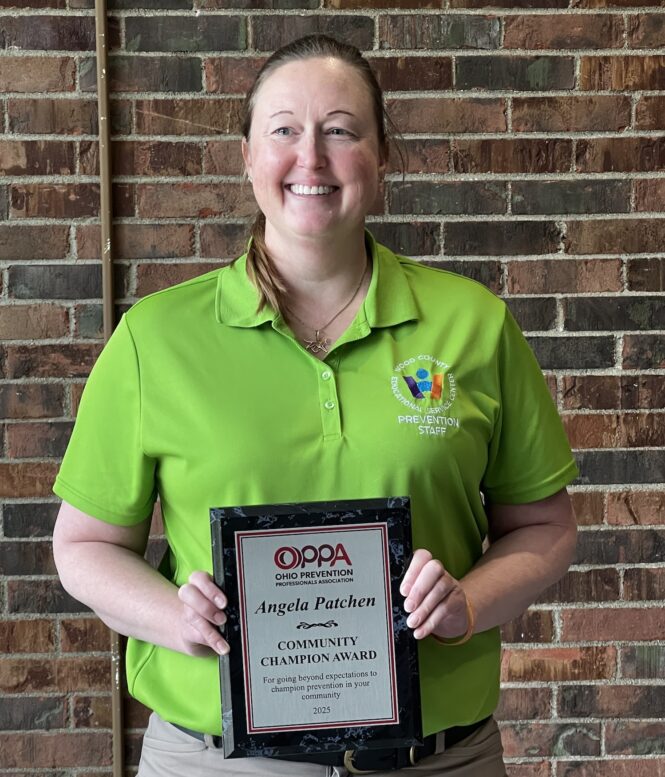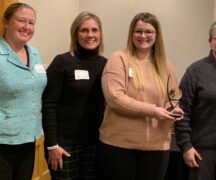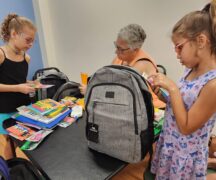By JULIE CARLE
BG Independent News
Angela Patchen may not wear a superhero cape, but she does possess a superpower. As the prevention education program manager at the Wood County Educational Service Center, she is a champion for prevention.
For over 10 years, her focus has been to help Wood County youths understand the consequences of their actions when it comes to alcohol and drugs, cigarettes and vapes and self control.
The Ohio Prevention Professionals Association recently deemed her a Community Champion during its 2025 annual awards ceremony. The award is given for going beyond expectations to champion prevention in their community.
“Angie Patchen has made prevention a priority in Wood County in more ways than can be counted,” stated OPPA Executive Director Jim Ryan.
She was credited with providing “a veritable smorgasbord of prevention and related services” in Wood County, and for supervising prevention staff at the ESC.
She is actively involved with the Wood County Prevention Coalition, the Wood County Suicide Prevention Coalition, and the Wood County Addiction Task Force. A forward-thinker, Angie also created a Community Engagement Coordinator, a Community-Based Diversion Program dealing with school-aged absenteeism.
Angie recognized years ago that statewide engagement would help build stronger services in Wood County. She actively engages in learning and dialogue opportunities with Problem Gambling Network of Ohio, Prevention Action Alliance, and the Ohio Prevention Professionals Association. She also serves on the Advisory Committee for the Statewide Prevention Coalition Association.
When she started at the center, Patchen was hired to oversee Project AWARE, a five-year, grant-funded program to increase awareness of mental health issues of school-aged youth, provide training for adults to recognize and respond to mental health challenges and improve access to behavioral health supports for students and families.
“I worked with the state as one of three counties that partnered for that grant,” she said. When the grant ended, Kyle Clark, director of prevention education programs, kept Patchen as prevention education manager. The promotion allowed her to gain more knowledge about substance use prevention.
“It didn’t take me long to realize how much I loved working in prevention,” she said. Though she has her bachelor’s and master’s degrees in social work, prevention is where her heart is these days.
“I want to be on this end of trying to mitigate problems before they get bad. I know there are always going to be some who slip through the cracks or that people need additional help beyond prevention, but my goal is to try to mitigate problems to ease the burden on the system.”
She has been a driving force in the county for the Positive Behavior Interventions & Support (PBIS) program.
“A lot of the programming that we offer through our prevention education falls under the umbrella of PBIS,” she said.
Patchen and Clark became trainers for teachers and administrators to help schools set universal expectations for youth in their buildings–how they should behave in the cafeteria, classes and restrooms.
She has also been involved in the Comprehensive School Threat Assessment Guidelines to help schools determine if a threat is real. The training helps schools ensure they take the threats seriously but are not overreacting.
“Kids say a lot of things that they don’t mean or they don’t have the means to follow through on threats,” she said. “Zero tolerance is kind of bad for kids, because they often say things without thinking or they don’t deserve to be in big trouble.”
A vital part of the training is to make sure people understand the importance of reporting if they hear or see something, say something. “There are systems for reporting those things,” she added.
The most significant work she does is work around suicide prevention, she said, as a member of the Suicide Prevention Coalition. “Getting that information out to people in the community is so important,” she said. She does work with teachers, administrators and other staff such as bus drivers, custodial workers and cafeteria staff. And as a member of the Suicide Prevention Coalition, her work goes beyond the walls of the schools and includes community members.
Youth Mental Health First Aid trains anyone in the community who works and/or lives with 12- to 18-year-olds. “We talk about what’s typical and what’s not typical, and how do you know when there’s a problem or a change, or what kinds of things to look for,” Patchen said. “I hope we are preparing people to have difficult conversations if they need to, but also knowing that talking about suicide doesn’t put that idea in their head.”
All of the topics are so important when talking about our youth, she said. “They need our support,” she said. “I know I had a great support system and school system that cared about me. I want to do whatever I can to help everybody’s kids have that same upbringing and same support.”
She is proud of the entire prevention education team at WCESC, from the members who are doing much of the training with teachers and administrators in the schools, and for the ones who are working with the students directly.
“It’s a real honor to be noticed among your peers,” Patchen said about winning the award. “I happen to think that Wood County’s prevention education program is unique and doing great things. The Wood County Alcohol, Drug Addiction and Mental Health Services Board’s funding has been crucial to the strength of the county’s programs,” she said.
Patchen also praised the schools for allowing the prevention education staff in the classrooms. “That’s a big ask to let us have that many weeks and class periods. But our evidence in the (biennial) survey that is done is that it is making a difference.”





